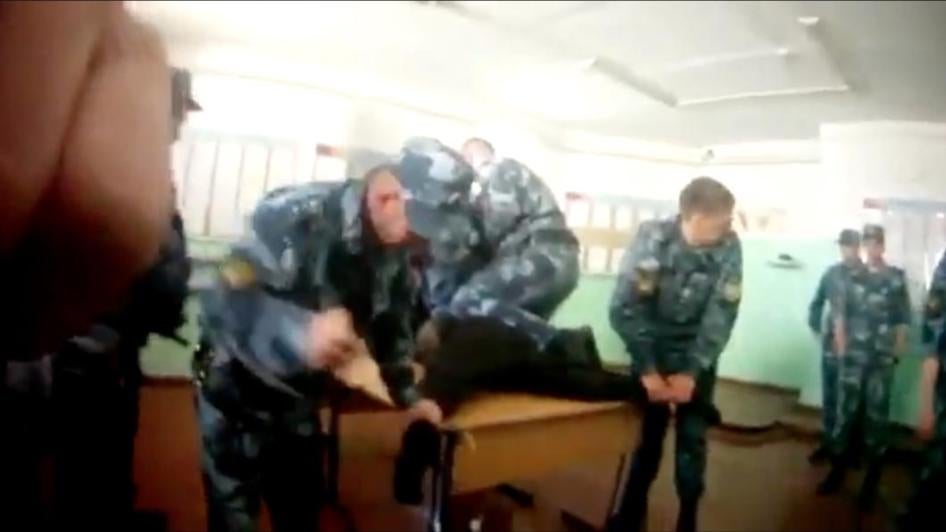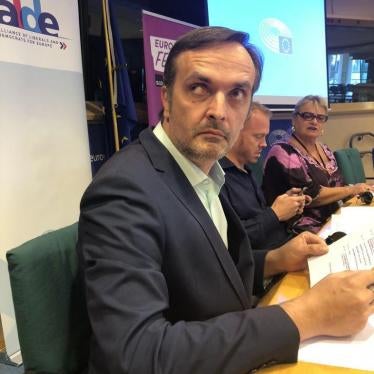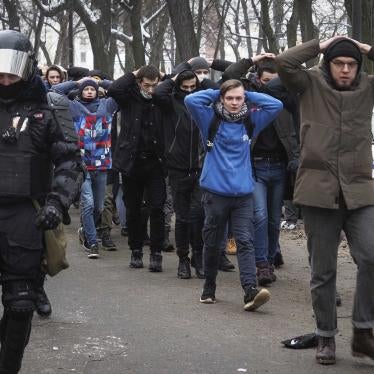On February 17, Russia’s parliament will consider new legislation aimed at punishing state officials who commit torture. The recent leak of multiple videos revealing horrific physical, sexual, and psychological abuse of inmates in prisons across the country highlighted the urgency of significant reform to end a culture of impunity. The draft law reclassifies torture by officials as an “especially grave crime” with a penalty of up to 12 years in prison. However, significant concerns remain over the potential impact of the legislation.
Videos released since October 5, 2021 by the prison abuse watchdog Gulagu.net revealed anal rape, beatings and verbal abuse in penal institutions in Saratov, Kaluga and Krasnoyarsk, among others. The grim revelations have shed light onto an issue too long ignored by the government. Public Verdict, a leading Russian rights group, commented that the incidents shown in the videos are “not excesses, but a routine management practice [in Russian prisons], with torture planned and carried out by penitentiary officials themselves.” After the leak of the first videos, showing three instances of anal rape in a prison hospital in Saratov, the ensuing scandal triggered an official response. The hospital’s leadership and employees of the local penitentiary service were fired. Criminal cases against the officers for sexual assault and abuse of power were reportedly opened, but the authorities have not since released any update.
In November of last year, President Vladimir Putin fired the director of the Federal Penitentiary Service, Alexander Kalashnikov – a move widely seen as a response to the shocking torture revelations. The draft legislation was introduced in the Duma in December. Нowever, the current draft appears problematic on several counts.
For the past decade, the United Nations’ Committee Against Torture has called on Russia to criminalize torture as an independent offence - and yet the draft law fails to do this, making it simply an aggravating factor to existing offences of abuse of power or coercion to testify. Natalia Taubina, the head of Public Verdict, also noted that torture should “undoubtedly” be a separate offence, because it is otherwise difficult to gather statistics on the prevalence and prosecution of torture.
The prohibition of torture under international law is absolute, allowing no justification for its use, and the new legislation should also reflect that. The current draft, on the other hand, would require investigators to prove that the torture was carried out with a specific aim, such as obtaining evidence. This represents an additional challenge. Taubina also said that, while the draft legislation broadly replicates the UN’s definition of torture, there is no explicit liability for those who incite others to commit torture, or who knew or should have known about torture and failed to act to prevent or punish it. According to Taubina, it is “extremely important that responsibility for torture should be borne not only by those who directly torture, but also those, higher up the power vertical, who know about this practice but remain silent.”
Most important, legal sanctions are only useful if they are enforced. The Fund for Defending the Rights of Prisoners has documented a wider problem of the prison authorities “defending their own” by hushing up cases of violence and torture. Vasily Lukovsky, an officer from Angarsk penal colony in Siberia, is currently under investigation over his alleged involvement in torturing hundreds of prisoners after a riot in 2020. One former prisoner, who gave evidence against him, has said that people he believes were officers of the Investigative Committee responsible for the pursuing the case against Lukovsky came to his home to try to intimidate him.
The problem of torture in Russia is not limited to penal institutions. Russian and international rights groups have also documented torture by law enforcement and security officers outside the penitentiary system. In 2018, a leading online media outlet, Meduza, gathered data on more than 50 torture cases reported in the public domain that year. The alleged torturers included police officers, investigators, and security agents, in addition to penitentiary officials. The alleged methods of torture ranged from beating to asphyxiation, electric shocks, restraint in stress positions, sleep deprivation, and denial of water, among others.
The UN Committee Against Torture has stated that it is “deeply concerned” by “numerous reliable reports” of torture in Russia, including as a means to extract confessions, and of the lack of prompt, impartial and effective investigations into these allegations. The committee further found that investigators dismiss many torture allegations without opening any criminal proceedings. The European Court of Human Rights has also made multiple findings of torture occurring in Russian prisons, police cells, and temporary detention facilities.
The government needs to take action now to end the use of torture in Russia. The Duma should ensure that any new anti-torture legislation creates a stand-alone offense of torture that meets the definition under international law, and includes criminal responsibility for all those who not only commit torture, but oversee the use of unlawful violence by their subordinates. If the Duma fails to ensure that the legal framework and its enforcement can deliver accountability for these crimes, the appalling abuse of prisoners and others detained by state agents will persist.










